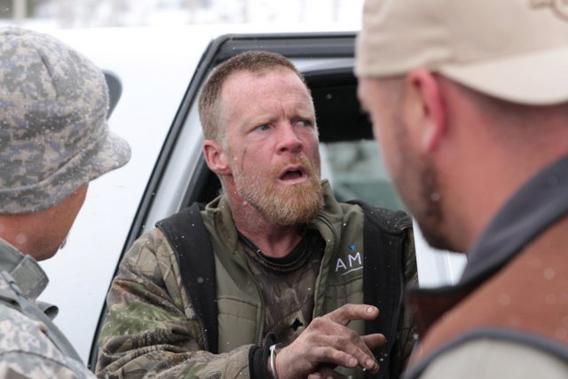Crime is Slate’s crime blog. Like us on Facebook, and follow us on Twitter @slatecrime.
The arrest Tuesday in rural Utah of wilderness survivalist Troy James Knapp puts to an end a years-long search for the elusive backcountry burglar who came to be known as the Mountain Man. Knapp spent about eight years living alone in the region, primarily off the land, allegedly burglarizing vacation cabins now and then when he needed food or shelter. The manhunt intensified when authorities learned the mysterious mountain man was Knapp, a drifter with a long, occasionally violent criminal history. He surrendered with a smile, reportedly tossing aside his rifle and laughing as he said, “You got me!” (Knapp’s arrest is really bad timing for Men’s Journal, which was just about to publish a long article asking what it would take to bring him in alive.)
The story has gotten a lot of press, in part because “living off the land” is such a romantic notion. This country was built by mountain men and women who made their own shelter, ate what they killed, and took no guff from polite society. But that was before the American frontier was cramped by hunting laws, property lines, and the hated National Park Service. Today, society is connected and constricted—and, thus, we’re impressed and intrigued when we learn that self-sufficient mountain men still exist.
This sense of romanticism is misplaced. I don’t know how many legitimate survivalists—self-sufficient, off-the-grid—actually exist. I would guess not many. I would also guess that it is functionally impossible to live entirely off the grid without breaking some laws. The Men’s Journal article makes it clear that even though Knapp was a preternaturally talented survivalist, he couldn’t have made it as long as he did without regularly turning to crime:
He would go from home to home, tapping a quarter-size hole in a windowpane and unfastening the latch. He would eat all the food he could find, burn all the firewood, and then move on. He hit dozens of cabins across the state, riffling through the cupboards, taking batteries, binoculars, canned goods, and camouflaged clothing—anything that would keep him alive, moving, and out of sight. He stole all the shoes he could, too, from boots to sneakers to sandals, so his tracks would be harder to follow.
It’s tempting to minimize these transgressions as minor ones, committed by someone who was simply trying to stay alive. (After all, since the barter system no longer really exists, and since mountain men don’t carry credit cards, Knapp likely had no other way to get the cans and batteries he apparently required.) But—as you might expect from someone who renounces society to go live by himself in the underbrush—he was still a dangerous, angry loner. The Men’s Journal piece notes that, as the manhunt intensified, Knapp became more aggressive: “He left behind bullet-riddled cabins and threatening notes for his pursuers. ‘Hey, sheriff, fuck you!’ one note read. ‘Gonna put you in the ground!’ ” Knapp has been accused of beating a homeless man over the head with a rock. He is suspected of murdering a retiree who lived in a cabin on Cedar Mountain. This isn’t Davy Crockett we’re talking about. It isn’t even the Barefoot Bandit.
Most of the time, when you read about criminals living by their wits in the hills, they are generally fugitives who are evading arrest for some other, much more horrible crime—Olympics bomber Eric Rudolph comes immediately to mind. Knapp is the rare mountain man who flipped that convention on its head, seemingly becoming more notorious after he took to the woods.
Maybe it’s a stereotype, but you generally don’t go off and live by yourself in the mountains unless you’ve got something to hide. Sometimes, you’re hiding from the police. Other times, you’re hiding from a violent, antisocial temperament that makes it hard for you to interact with humans. Yes, it’s impressive that Troy Knapp spent so much time living off the land. But it’s a good thing that he’s now off the land.
